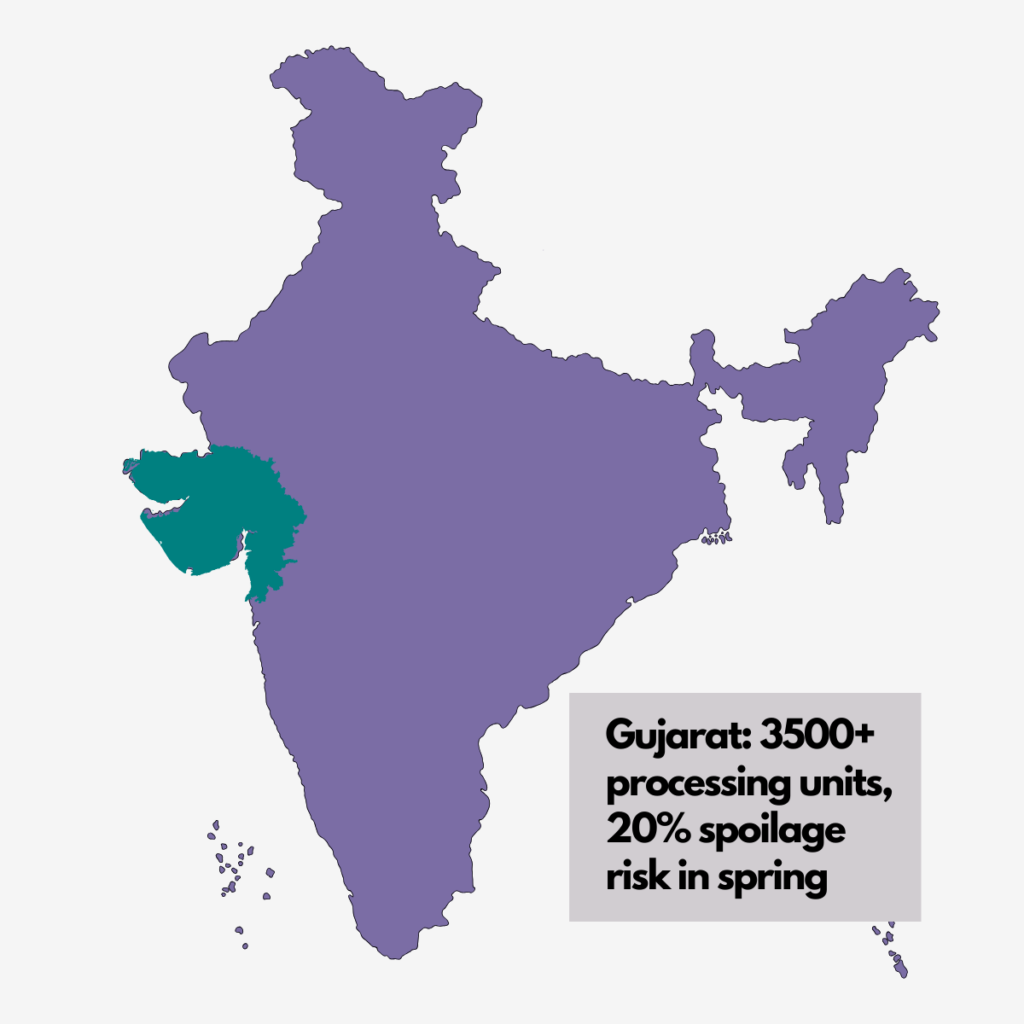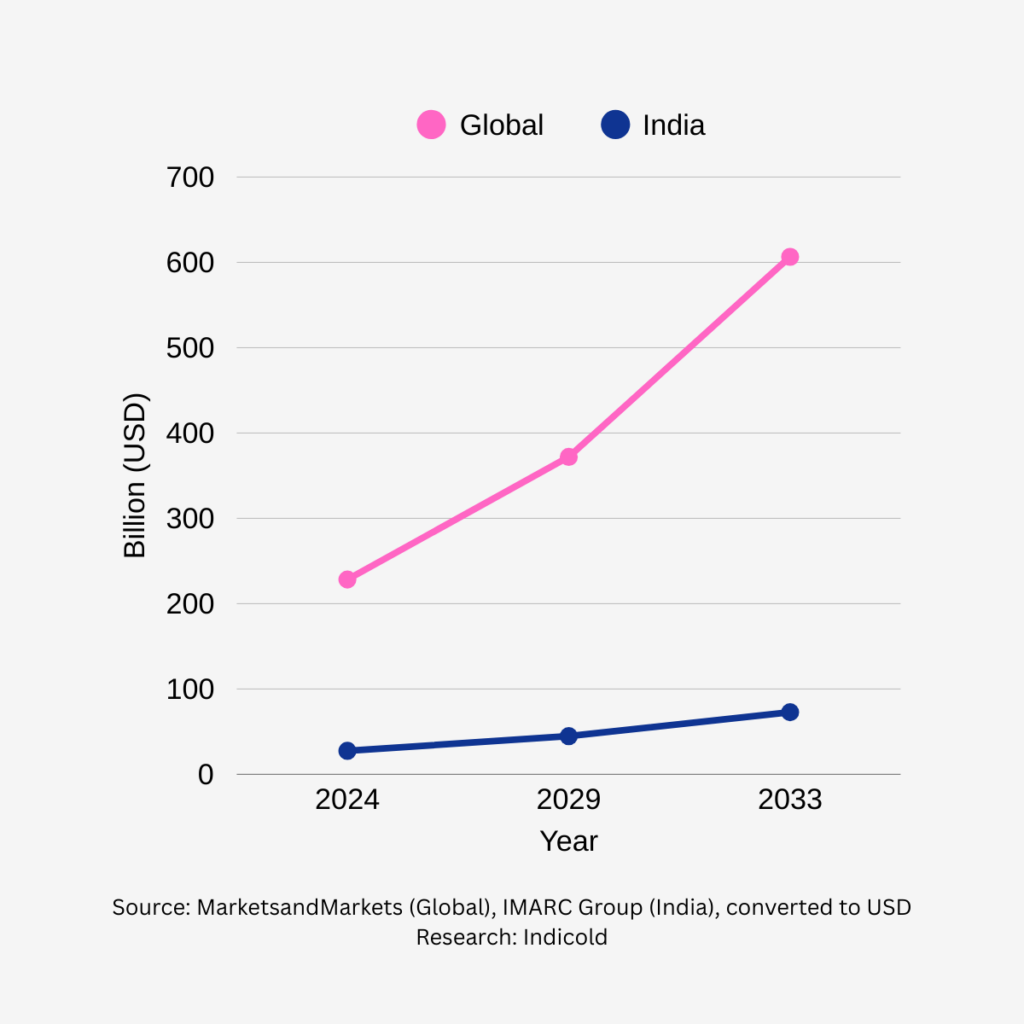The cold chain industry is a lifeline for global food security and healthcare, ensuring perishable goods like fresh produce and vaccines reach their destinations safely. In India, where 40% of food production is wasted annually (FAO, 2023), and globally, where the cold chain market is expected to reach $628 billion by 2028 (MarketsandMarkets, 2023), the demand for skilled professionals has never been higher. At Indicold, we’re committed to training the next generation of cold chain experts to meet these challenges. This blog explores the critical need for workforce development, how Indicold is leading the way, and why businesses in India, Gujarat, and beyond must invest in training to secure a sustainable future.
The Global and Local Demand for Cold Chain Expertise
Globally, the cold chain sector is growing at a CAGR of 9% from 2023 to 2028, driven by rising demand for perishables and pharmaceuticals (MarketsandMarkets, 2023). In India, the market is projected to hit $21.5 billion by 2026, fueled by a 14% annual increase in demand for frozen and chilled foods (IMARC Group, 2024). However, a 2023 report by the Global Cold Chain Alliance (GCCA) highlights a stark challenge: 65% of cold chain operators worldwide struggle to find workers skilled in ammonia refrigeration, IoT monitoring, and safety compliance. In Gujarat, a hub for India’s food processing industry with over 3,500 units (Gujarat Industrial Development Corporation, 2024), this skills gap is even more pronounced, as businesses scale to meet export demands.
Spring 2025 exacerbates these challenges. Rising temperatures in India, often exceeding 35°C in regions like Gujarat, threaten 20% of perishable shipments with spoilage (Indian Council of Agricultural Research, 2023). Without a trained workforce, businesses face inefficiencies, safety risks, and financial losses—potentially $1.5 billion annually in India alone (ASSOCHAM, 2022).

Indicold’s Role in Workforce Development
At Indicold, we’re addressing this skills shortage head-on with comprehensive training programs tailored to the cold chain’s evolving needs. Our initiatives focus on three pillars:
- Safety Training: We train our team to manage ammonia-based refrigeration systems, which power our energy-efficient warehouses. Regular safety drills, including fire prevention and emergency response, ensure compliance with global standards like ISO 22000.
- Technology Proficiency: Our Automated Storage and Retrieval System (ASRS) in Gujarat, one of India’s largest, handles 10,000 pallets daily with precision. We provide hands-on training on IoT monitoring and automation, equipping staff to manage real-time data and optimize storage conditions.
- Sustainability Skills: With low-GWP refrigerants and solar-powered facilities, we’ve reduced energy consumption by 20% compared to industry averages (IndiCold internal data, 2024). Our workforce is trained to maintain these green practices, aligning with India’s National Action Plan on Climate Change.
These efforts ensure our team can handle the complexities of modern cold chain logistics, from Gujarat’s mango exports to global pharma aspirations, especially as World Health Day on April 7, 2025, underscores the need for precision in healthcare logistics.

Why Invest in Training? A Global, Indian, and Regional Perspective
Investing in workforce development is a strategic imperative for businesses at all levels. Here’s why:
1. Boosting Efficiency and Safety
Globally, untrained staff contribute to 30% of cold chain spoilage incidents (GCCA, 2023). In India, where 50% of cold storage facilities lack modern safety protocols (FICCI, 2023), this risk is higher. A trained workforce can reduce these losses, saving businesses millions. In Gujarat, where food exports grew 12% in 2024 (Gujarat State Export Report, 2024), safety training is critical to maintaining quality standards.
2. Preparing for Industry Growth
The global pharma cold chain is expected to grow 15% annually through 2030, driven by vaccine distribution (Pharma Logistics IQ, 2024). In India, the government’s push for 100% vaccination coverage by 2026 (Ministry of Health, 2024) demands skilled workers. Training now ensures businesses are ready for this shift, a priority Indicold is addressing as we expand our capabilities.
3. Gaining a Competitive Edge
In Gujarat, where 70% of cold chain operators are small to medium enterprises (SMEs) (GIDC, 2024), a skilled workforce sets businesses apart. Globally, companies with certified teams report 25% higher client retention (LinkedIn Workforce Report, 2023). Training positions Indicold—and our partners—as trusted leaders.
4. Long-Term Cost Savings
Training reduces spoilage, regulatory fines, and turnover. In India, where labor turnover in logistics averages 20% annually (TeamLease, 2024), trained employees are 45% more likely to stay (LinkedIn, 2023). For Gujarat’s SMEs, this stability translates to savings of up to ₹5 lakh per year per facility (ASSOCHAM, 2023).

The Risks of Inaction
Neglecting training has severe consequences. Globally, 40% of cold chain disruptions stem from human error (GCCA, 2023). In India, improper ammonia handling has led to 15 major incidents since 2020, costing $10 million in damages (National Disaster Management Authority, 2024). Regionally, Gujarat’s SMEs risk losing export contracts if they can’t meet international safety and quality standards, a growing concern as the state aims to double its food exports by 2030 (Gujarat Export Vision, 2024).
Indicold’s Call to Action for the Industry
Indicold’s training programs are a blueprint for the industry. Our focus on safety, technology, and sustainability ensures we’re ready for global challenges, from Gujarat’s food exports to India’s pharma ambitions. We urge businesses to invest in training to build resilience, especially as spring 2025 tests cold chains with rising temperatures.
Join Us in Building the Future
The cold chain’s success hinges on a skilled workforce. Whether you’re a Gujarat-based SME, an Indian food distributor, or a global player, IndiCold can help. Contact us for a free consultation to explore team solutions tailored to your needs. Email us at hello@indicold.com or DM us to get started.
Let’s train the next generation together—ensuring a future where every shipment, from mangoes to medicines, arrives safely.


Leave a Reply